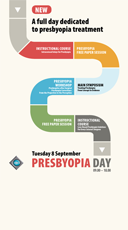Deep trephination to standardize pneumatic dissection of deep anterior lamellar keratoplasty
(results will display both Free Papers & Poster)
Session Details
Session Title: Presented Poster Session: Cornea - Surgical
Session Date/Time: Saturday 05/09/2015 | 15:00-16:30
Paper Time: 16:20
Venue: Poster Village: Pod 4
First Author: : M.Busin ITALY
Co Author(s): : V. Scorcia P. Leon M. Mimouni Y. Nahum
Abstract Details
Purpose:
To evaluate the use of a deep trephination to standardize deep anterior lamellar keratoplasty (DALK), thus yielding a high success rate and speeding up the learning curve of pneumatic dissection.
Setting:
Retrospective cohort study of eyes operated at a private hospital by a single surgeon (MB).
Methods:
Success rates and learning curves were analyzed in non-scarred keratoconic eyes undergoing DALK with 2 different techniques, differing mainly in the depth of trephination (technique 1=300 µm; technique 2=500-550 µm) and in the subsequent insertion of blunt probe and dedicated cannula at the base of the trephination (technique 1=downwards trying to reach a plane as close as possible to Descemet membrane; technique 2=tangentially trying to maintain the plane reached by the trephination).
Results:
The rate of big bubble formation of technique 1 (26/51 eyes=50.9%) was significantly lower (p<0.0001) than that of technique 2 (48/53 eyes=90.6%). A significant correlation between number of cases performed and success rate was found only for technique 1. The only microperforation occurring during deep trephination was managed by conversion to mushroom keratoplasty.
Conclusions:
Deep trephination up to 500-550 µm is instrumental in obtaining a significant flattening of the learning curve of pneumatic dissection, while achieving a constant success rate above 80%.
Financial Disclosure:
One or more of the authors travel has been funded, fully or partially, by a company producing, developing or supplying the product or procedure presented





